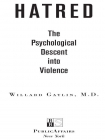Hatred by Willard Gaylin (best manga ereader txt) 📗

- Author: Willard Gaylin
Book online «Hatred by Willard Gaylin (best manga ereader txt) 📗». Author Willard Gaylin
Next, we must apply the tools of modern psychological knowledge to the problem of hatred. I do not presume to believe that in the end I, or anyone, will be able to “explain” the Jedwabne massacre. It is incomprehensible. Our minds will not take it in. We cannot recognize such perversity as being explicable within the conditions of human sensibility, any more than we can understand murderers eating the body parts of their victims or men having sex with infants.
Still in this amalgam of malignancy and horror that permeated the Holocaust and the current terrorist attacks, there are common elements of hatred that are understandable. A suicide bomb directed at a school bus is composed of the everyday elements of nails, wires, and a cheap radio. It is equally composed of anger, despair, self-justification, cynical manipulation, promise, and perversity. It is time to deconstruct the hater the way we deconstruct his weapons.
“What do they want from us?” is the common question of the day. It is a question that invites socioeconomic and political explanations. But they are insufficient. The question presumes a rational basis for hatred and suggests a direct link between the hater’s needs and the selection of his victims. It will not explain the kind of perversity we are today experiencing, any more than it could explain the massacre of the Jews in the Holocaust. It denies the pathological core of hatred. To understand hatred we must do what Euripides and Shakespeare did. We must get into the head of the hater. We now have a psychological framework for doing this. We must apply modern psychological understanding of perception, motivation, and behavior to discover what hatred is. Only when we have identified the nature of the beast can we properly address the environmental conditions that support it.
Hatred is severe psychological disorder. The pathological haters, whether Al Qaeda today or the Nazis under Hitler, claim to be fighting in defense of an ideology. In truth, the ideology is a convenient rationalization. They are externalizing their internal frustrations and conflicts on a hapless scapegoat population. They are “deluded,” and their self-serving and distorted perceptions allow them to justify their acts of hatred against the enemy they have created.
We must start our investigation, therefore, with an examination of the hater’s mind rather than his milieu. What is he thinking and feeling? What motivates him? What, if anything, will satisfy him? Does he even know? These are questions that I deal with daily in trying to understand and treat the havoc that the neurotic patient wreaks on himself and those around him. An application of such psychological knowledge is essential if we are to confront the organized terror that now threatens the entire civilized world. To date there has been little call for such information, and little volunteered from the psychological community.
The 9/11 bombings brought home to Americans, in particular, the awareness that understanding hatred is no longer a theoretical problem. We have been treated to pictures of jubilant Arab crowds cavorting in the streets and shouting their delight at the tragic deaths in the United States as a consequence of the World Trade Center massacres. Their palpable hatred of us leaps off the screen, affronting our senses.
There is nothing new about such hatred. What is new is provided by our modern world of technology—the extraordinary reach of the haters and the frightening potential for destruction of the available tools. These innovations add an imperative to the need for containing the emerging cultures of hatred. We must investigate and understand hatred now, before it seeps into our civilized world and destroys our way of life. It is a matter of survival.
2
DEFINING HATRED
Early attempts to define the problem of hatred have not been encouraging. I have already rejected as simplistic (and just plain wrong) the assumption that hatred is normal to the huplain wrong) the assumption that hatred is normal to the human condition. Even given the opportunity—freedom to do it and go unpunished—we would not all enjoy torturing and killing our neighbors, or even our enemies.
I equally reject the economic and sociological explanations for acts driven by hatred. The desperation in the Palestinian camps does not justify, or explain, the acts of terrorism Palestinians commit. It is not that poverty is irrelevant but that it is not a sufficient condition for hatred; not all poor communities harbor such hatred, nor do they commit terrorist acts. The poverty in America during the Great Depression is incomprehensible to Americans who try to understand it by extrapolation from the “hard times” and recessionary phases of the last thirty years of the twentieth century. The Great Depression was a monumental burden on the American people during the 1930s. Yet there was a remarkable absence of malice toward authority or government. Indeed, the most powerful man in the land, Franklin D. Roosevelt, was adored by the deprived populations of the country, just as he was abhorred by the privileged classes, who lived in a state of luxury facilitated by the cheap labor of the time.
Nor is poverty a necessary condition for a culture of hatred; not all communities of hatred are poor. The skinheads in America did not arise from any despised and deprived minority. They emerged from the white Protestant community, which constitutes the majority in this country. The lynch mobs in the southern states were culled from the oppressor, not the oppressed, albeit still not the privileged classes in that hierarchical time. The poorest countries of Europe did not sponsor Hitler and the Holocaust. The Germans were hardly the most primitive and uneducated people.
When we began





Comments (0)